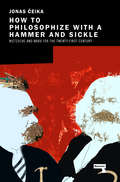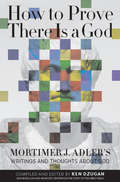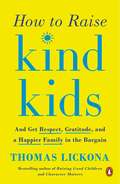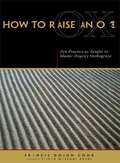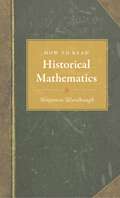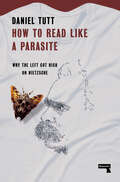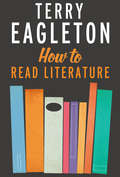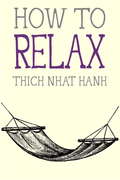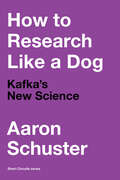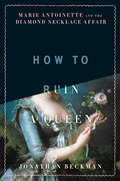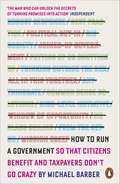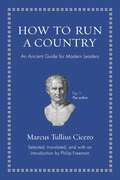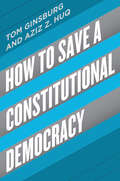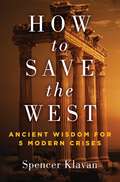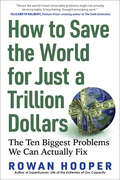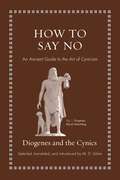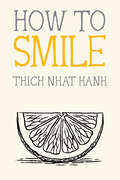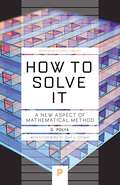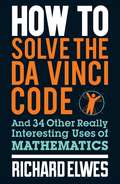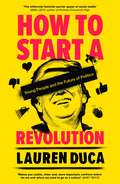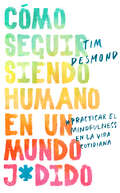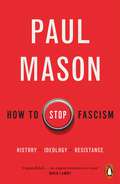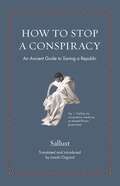- Table View
- List View
How to Philosophize with a Hammer and Sickle: Nietzsche and Marx for the 21st-Century Left
by Jonas CeikaFrom the creator of the Cuck Philosophy YouTube channel comes this timely and explosive re-evaluation of Marx and Nietzsche for the 21st-century left.Modernity has been defined by humanity's capacity for self-destruction.Over the last century, the means which threaten not only life's joy but its very existence have only multiplied. At the same time, as a new wave of nationalism and right-wing politics spreads across the world, fewer and fewer people are being convinced that socialism could improve their everyday lives, let alone save us from our own destruction.In this timely and explosive book, philosopher and YouTuber Jonas Čeika (aka Cuck Philosophy) re-invigorates socialism for the twenty-first century. Leaving behind its past associations with bureaucracy and state tyranny, and it's lifeless and drab theoretical accounts, Čeika instead uses the works of Marx and Nietzsche to reconnect socialism with its human element, presenting it as something not only affecting, but created by living, breathing, suffering human individuals.At a time when ecological collapse is hurtling towards us, and capitalism offers no solution except more growth and exploitation, How to Philosophise with a Hammer and Sickle shows us the way forward to a socialism grounded in human experience and accessible to all.
How to Prove It: A Structured Approach
by Daniel J. VellemanProofs play a central role in advanced mathematics and theoretical computer science, yet many students struggle the first time they take a course in which proofs play a significant role. This bestselling text's third edition helps students transition from solving problems to proving theorems by teaching them the techniques needed to read and write proofs. Featuring over 150 new exercises and a new chapter on number theory, this new edition introduces students to the world of advanced mathematics through the mastery of proofs. The book begins with the basic concepts of logic and set theory to familiarize students with the language of mathematics and how it is interpreted. These concepts are used as the basis for an analysis of techniques that can be used to build up complex proofs step by step, using detailed 'scratch work' sections to expose the machinery of proofs about numbers, sets, relations, and functions. Assuming no background beyond standard high school mathematics, this book will be useful to anyone interested in logic and proofs: computer scientists, philosophers, linguists, and, of course, mathematicians.
How to Prove There Is a God
by Mortimer Adler Ken DzuganOne of the great tasks of Mortimer Adler's illustrious life was his search for a watertight proof of the existence of God. Adler believed that his search had been successful.Adler spent years studying the classic proofs of God's existence, especially Aquinas's Five Ways, and found shortcomings in all of them, as conventionally understood. But he thought that some of them contained ideas which, if properly developed, could be improved, and he continued to search for a satisfying and logically unassailable proof. Toward the end of the 1970s, he believed he had arrived at such a proof, which he presented in his historic work, How to Think about God (1980). In the writings assembled in How to Prove There Is a God, Adler gives us his approach to the question of God's existence in fresh and popular form. He defends his position against critics, both believers and skeptics. The book includes a transcript of one of Adler's appearances on William Buckley's Firing Line, Adler's revealing interview with Edward Wakin, the exchange of views on natural theology between Adler and Owen Gingerich, and John Cramer's eloquent argument that the trend of modern cosmology supports Adler's early struggles with the question of God's existence.
How to Raise Kind Kids: And Get Respect, Gratitude, and a Happier Family in the Bargain
by Thomas LickonaCan you teach a child to be kind? This vital question is taking on a new urgency as our culture grows ever more abrasive and divided. We all want our kids to be kind. But that is not the same as knowing what to do when you catch your son being unkind. A world-renowned developmental psychologist, Dr. Thomas Lickona has led the character education movement in schools for forty years. Now he shares with parents the vital tools they need to bring peace and foster cooperation at home. Kindness doesn’t stand on its own. It needs a supporting cast of other essential virtues—like courage, self-control, respect, and gratitude. With concrete examples drawn from the many families Dr. Lickona has worked with over the years and clear tips you can act on tonight, How to Raise Kind Kids will help you give and get respect, hold family meetings to tackle persistent problems, discipline in a way that builds character, and improve the dynamic of your relationship with your children while putting them on the path to a happier and more fulfilling life.
How to Raise an Ox
by Taizan Maezumi Roshi Eihei Dogen Francis Dojun CookThe writings of Zen master Dogen are among the highest achievements not only of Japanese literature but of world literature. Dogen's writings are a near-perfect expression of truth, beautifully expressing the best of which the human race is capable. In this volume, Francis Cook presents ten selections from Dogen's masterwork, the Shobogenzo, as well as six of his own essays brilliantly illuminating the mind of this peerless master.
How to Read Historical Mathematics
by Benjamin WardhaughTechniques for deciphering texts by early mathematiciansWritings by early mathematicians feature language and notations that are quite different from what we're familiar with today. Sourcebooks on the history of mathematics provide some guidance, but what has been lacking is a guide tailored to the needs of readers approaching these writings for the first time. How to Read Historical Mathematics fills this gap by introducing readers to the analytical questions historians ask when deciphering historical texts.Sampling actual writings from the history of mathematics, Benjamin Wardhaugh reveals the questions that will unlock the meaning and significance of a given text—Who wrote it, why, and for whom? What was its author's intended meaning? How did it reach its present form? Is it original or a translation? Why is it important today? Wardhaugh teaches readers to think about what the original text might have looked like, to consider where and when it was written, and to formulate questions of their own. Readers pick up new skills with each chapter, and gain the confidence and analytical sophistication needed to tackle virtually any text in the history of mathematics.Introduces readers to the methods of textual analysis used by historiansUses actual source material as examplesFeatures boxed summaries, discussion questions, and suggestions for further readingSupplements all major sourcebooks in mathematics historyDesigned for easy referenceIdeal for students and teachers
How to Read Like a Parasite: Why the Left Got High on Nietzsche
by Daniel TuttA how-to guide for the left on how to overcome Nietzsche's divisive and damaging influence."Beautifully written and bursting with spirit, How to Read Like a Parasite is destined to be vital reading." - Matthew McManus, author of Nietzsche and the Politics of ReactionHow to Read Like a Parasite overturns the whitewashed and defanged version of Nietzsche that has been made popular by generations of translators and academic philosophers who have presented his work as apolitical and without a core reactionary agenda.The central argument of the book is that Nietzsche&’s philosophy does have a center, and that the left learns a great deal from Nietzsche when we read him as driven by a highly sophisticated reactionary political vision that informs all his major concepts and ideas.The most important Nietzschean concepts — from perspectivism, ressentiment, eternal return to the pathos of distance — are analyzed in the historical context in which Nietzsche lived and wrote, and several case-studies of prominent left-Nietzscheans from Jack London, Gilles Deleuze, Wendy Brown to Huey Newton are discussed.How to Read Like a Parasite makes a persuasive case for how we can overcome Nietzsche&’s damaging influence on the left, showing us how to read and understand his work without becoming victims of it.
How to Read Literature
by Terry EagletonWhat makes a work of literature good or bad? How freely can the reader interpret it? Could a nursery rhyme like Baa Baa Black Sheep be full of concealed loathing, resentment, and aggression? In this accessible, delightfully entertaining book, Terry Eagleton addresses these intriguing questions and a host of others. How to Read Literature is the book of choice for students new to the study of literature and for all other readers interested in deepening their understanding and enriching their reading experience.In a series of brilliant analyses, Eagleton shows how to read with due attention to tone, rhythm, texture, syntax, allusion, ambiguity, and other formal aspects of literary works. He also examines broader questions of character, plot, narrative, the creative imagination, the meaning of fictionality, and the tension between what works of literature say and what they show. Unfailingly authoritative and cheerfully opinionated, the author provides useful commentaries on classicism, Romanticism, modernism, and postmodernism along with spellbinding insights into a huge range of authors, from Shakespeare and J. K. Rowling to Jane Austen and Samuel Beckett.
How to Relax
by Thich Nhat Hanh Jason DeantonisHow to Relax is part of The Mindfulness Essentials series of how-to titles by Zen Master Thich Nhat Hanh, introducing beginners and reminding seasoned practitioners of the essentials of mindfulness practice. <P> Pocket-sized, with original two color illustrations by Jason DeAntonis, How to Relax shows how critical it is to regularly interrupt the hub-bub and routine of our lives to stop, relax mindfully, and recharge.Thich Nhat Hanh says that when we relax, we "become calm water, and we will reflect reality as it is. If we're not calm, the image we reflect will be distorted. When the image is distorted by our minds, it's not the reality, and it causes lots of suffering." Relaxation is essential for accessing the tranquility and joy that lead to increased personal well-being. With sections on healing, relief from nonstop thinking, transforming unpleasant sounds, solitude, being peace, and more, How to Relax includes meditations you can do to help you achieve the benefits of relaxation no matter where you are.Scientific studies indicate that meditation contributes tremendously to well-being, general health, and longevity. How to Relax is a unique gift for those who want a simple guide to achieving deep relaxation, controlling stress, and renewing mental freshness and clarity, appropriate for those practicing in any spiritual tradition, whether seasoned practitioners or new to meditations.With fifteen two color drawings by celebrated artist Jason DeAntonis.
How to Research Like a Dog: Kafka’s New Science (Short Circuits)
by Aaron SchusterA provocative book that proposes a new and surprising inspiration for philosophy today—the canine thinker from Kafka&’s story &“Investigations of a Dog.&” Written toward the end of Kafka&’s life, &“Investigations of a Dog&” (Forschungen eines Hundes, 1922) is one of the lesser-known and most enigmatic works in the author&’s oeuvre. Kafka&’s tale of philosophical adventure is that of a lone, maladjusted dog who challenges the dogmatism of established science and pioneers an original research program in pursuit of the mysteries of his self and his world. In How to Research Like a Dog, Aaron Schuster uses the canine as a guide dog to rediscover Kafka&’s fictional universe, while taking up the cause of this ingenious, possessed, melancholy, comical, and revolutionary thinker.Neither an exercise in literary criticism nor a traditional philosophical commentary, this charming and idiosyncratic book aligns itself with the research program of Kafka&’s dog. It constructs an &“impossible&” system based on the fourfold division of nourishment, music, incantation, and freedom—or, stated a bit differently: enjoyment, art, institutions, and freedom. From Plato to Flaubert, Lispector, and Lacan, Schuster puts the dog in dialogue with psychoanalytic theory, the history of philosophy, and modern literature. Imagining the &“Unknown University&” that Kafka&’s new science calls for, the book enlists new comrades in the dog&’s struggle.
How to Ruin a Queen: Marie Antoinette and the Diamond Necklace Affair
by Jonathan BeckmanA tale of greed, lust, deceit, theft on an extraordinary scale, charlatanry, kidnapping, assassination and escape from prison.
How to Run A Government: So that Citizens Benefit and Taxpayers Don't Go Crazy
by Michael BarberBillions of citizens around the world are frustrated with their governments. Why is this? And what can we do about it? In this groundbreaking book Michael Barber draws on his wealth of international experience advising political leaders, to show how those in power can make good on their promises. 'Refreshingly ruthless ... has an uplifting brio to it' Economist'Michael Barber is a source of inspiration and wisdom' Andrew Adonis, New Statesman'Excellent ... there is a lot of common sense and practical wisdom ... a breath of fresh air' David Willetts,Standpoint'Barber is the global overlord of public policy ... a record around the world of actually achieving change' Philip Collins, Prospect
How to Run a Country: An Ancient Guide for Modern Leaders (Ancient Wisdom for Modern Readers)
by Marcus Tullius CiceroTimeless political wisdom from ancient history's greatest statesmanMarcus Cicero, Rome's greatest statesman and orator, was elected to the Roman Republic's highest office at a time when his beloved country was threatened by power-hungry politicians, dire economic troubles, foreign turmoil, and political parties that refused to work together. Sound familiar? Cicero's letters, speeches, and other writings are filled with timeless wisdom and practical insight about how to solve these and other problems of leadership and politics. How to Run a Country collects the best of these writings to provide an entertaining, common sense guide for modern leaders and citizens. This brief book, a sequel to How to Win an Election, gathers Cicero's most perceptive thoughts on topics such as leadership, corruption, the balance of power, taxes, war, immigration, and the importance of compromise. These writings have influenced great leaders—including America's Founding Fathers—for two thousand years, and they are just as instructive today as when they were first written.Organized by topic and featuring lively new translations, the book also includes an introduction, headnotes, a glossary, suggestions for further reading, and an appendix containing the original Latin texts. The result is an enlightening introduction to some of the most enduring political wisdom of all time.
How to Save a Constitutional Democracy
by Tom Ginsburg Aziz Z. HuqWe can’t afford to be complacent any more: “A formidable book . . . extremely rich in historical examples, case studies, and quantitative data.” —International Journal of Constitutional LawDemocracies are in danger. Around the world, a wave of populist leaders threatens to erode the core structures of democratic self-rule. In the United States, the tenure of Donald Trump marks a decisive turning point for many. What kind of president intimidates jurors, calls the news media the “enemy of the American people,” and seeks foreign assistance investigating domestic political rivals? Many think the Constitution will safeguard us from lasting damage. But is that assumption justified?Drawing on an array of other countries’ experiences, Tom Ginsburg and Aziz Z. Huq show how constitutional rules can both hinder and hasten the decline of democratic institutions. The checks and balances of the federal government, a robust civil society and media, and individual rights—such as those enshrined in the First Amendment—often fail as bulwarks against democratic decline. The sobering reality, they contend, is that the US Constitution’s design makes democratic erosion more, not less, likely. Its structural rigidity has had unforeseen consequence—leaving the presidency weakly regulated and empowering the Supreme Court to conjure up doctrines that ultimately facilitate rather than inhibit rights violations. Even the bright spots in the Constitution—the First Amendment, for example—may have perverse consequences in the hands of a deft communicator who can degrade the public sphere by wielding hateful language banned in many other democracies. We—and the rest of the world—can do better, and the authors conclude by laying out practical steps for how laws and constitutional design can play a more positive role in managing the risk.“This book makes a huge contribution to our understanding of how democracies erode and what institutional reforms would make it harder for authoritarian populists to entrench their power.” —Yascha Mounk, author of The People vs. Democracy“Whereas other recent books on the crisis of American democracy focus on what has gone wrong, Ginsburg and Huq provide us with clear-eyed proposals—including some bold constitutional reforms—for how to fix it.” —Steven Levitsky, New York Times–bestselling coauthor of How Democracies Die
How to Save the West: Ancient Wisdom for 5 Modern Crises
by Spencer KlavanThe coronavirus pandemic conferred enormous power on certain government officials. They have no intention of giving it up.In the space of a few weeks in early 2020, Americans witnessed the imposition of previously unimagined social controls by the biomedical security state—the unelected technocrats who suddenly enjoyed nearly absolute power to incarcerate, isolate, and medicate the entire population. In this chilling new book, a dissident scientist reveals the people and organizations that form the biomedical security state its role in the origin of the pandemic and shaping the government response why it is a threat to science, public health, and individual freedom what can be done to confront and defeat this new Leviathan When covid-19 broke out, Dr. Aaron Kheriaty&’s work put him on the front lines. Realizing that the mental, physical, and economic toll of lockdowns was catastrophic, he began to protest that the cure was worse than the disease—an intolerable heresy. When he refused vaccination because he had natural immunity from a previous infection, the University of California, Irvine, medical school fired him. He fought back, in the courts and in the media, and has become a reliable source of truth amid official obfuscation and censorship. Now it&’s time for all of us to fight back. The deadly and arrogant misrule of the biomedical security state must not become the "new normal."
How to Save the World for Just a Trillion Dollars: The Ten Biggest Problems We Can Actually Fix
by Rowan HooperWhat would you do with a trillion dollars? The ultimate thought experiment opens our eyes to ten world-changing ideas within our grasp If we can come up with a trillion dollars to bail out banks, imagine what else we could do. Science journalist Rowan Hooper decided to find out, speaking with experts of all kinds about ten incredibly ambitious projects that— if realized—would secure profound, enduring benefits: trying to end global poverty, reverse climate change, extend our lifespans, refreeze the Arctic, save all endangered species, and more. Then, he dives into strategies and costs to see: How far would $1 trillion really go? You’ll have to read on to learn which project he concludes would do the most good . . . but the biggest surprise is how many astonishing advances are actually within our grasp—if we dare to reach for them.
How to Say No: An Ancient Guide to the Art of Cynicism (Ancient Wisdom for Modern Readers)
by DiogenesAn entertaining and enlightening collection of ancient writings about the philosophers who advocated simple living and rejected unthinking conformityThe Cynics were ancient Greek philosophers who stood athwart the flood of society’s material excess, unexamined conventions, and even norms of politeness and thundered “No!” Diogenes, the most famous Cynic, wasn’t shy about literally extending his middle finger to the world, expressing mock surprise that “most people go crazy over a finger.” When asked why he was called Diogenes the Dog, he replied “because I fawn on those who give, I bark at those who don’t, and I bite scoundrels.” How to Say No is a delightful collection of brief ancient writings about Cynicism that captures all the outrageousness, wit, and wisdom of its remarkable cast of characters—from Diogenes in the fourth century BCE to the column-stander Symeon Stylites in late antiquity.With their “less is more” approach to life, the Cynics speak urgently to our world of climate change, economic uncertainty, and psychic malaise. Although the Cynics weren’t writers, their memorable utterances and behavior were recorded by their admirers and detractors, and M. D. Usher offers fresh new translations of appealing selections from this body of writing—ranging from street sermons and repartee to biography and snapshots of Cynics in action.Complete with introductions to the volume and each selection as well as the original Greek and Latin on facing pages, this lively book demonstrates why the Cynics still retain their power to surprise us and make us laugh—and to make us think and question how we live.
How to Smile (Mindfulness Essentials #10)
by Thich Nhat HanhThe final book in the bestselling How To series: simple, refreshing meditations of Zen Master Thich Nhat Hanh give us inspiration and tools for transforming our suffering and cultivating happinessIn inspiring passages and simple exercises, Zen Master Thich Nhat Hanh teaches us what he calls &“the art of suffering.&” He gives us teachings and tools for transforming suffering as well as ways to touch moments of happiness and smile even while suffering is still there.Written with characteristic simplicity and wisdom, these insightful meditations—born from the Zen master&’s lifetime of Zen practice and peacemaking—teach us how to come back to ourselves, calm our body and mind, and not let suffering overwhelm us. When we&’re willing to face our suffering and look deeply into it, we begin to understand its origins. Transformation and healing become possible, and along with it a greater capacity to understand the suffering of others and resolve conflicts in our relationships. Creating peace and understanding in ourselves and our relationships in this way is essential for helping create true understanding and peace in our communities, society, and the world. Thich Nhat Hanh offers practices for transforming our own suffering, listening deeply to the suffering of others, and especially how to cultivate our own smile and happiness.All Mindfulness Essentials books are illustrated with playful sumi-ink drawings by California artist Jason DeAntonis.
How to Solve It: A New Aspect of Mathematical Method (Princeton Science Library #34)
by George PolyaThe bestselling book that has helped millions of readers solve any problemA must-have guide by eminent mathematician G. Polya, How to Solve It shows anyone in any field how to think straight. In lucid and appealing prose, Polya reveals how the mathematical method of demonstrating a proof or finding an unknown can help you attack any problem that can be reasoned out—from building a bridge to winning a game of anagrams. How to Solve It includes a heuristic dictionary with dozens of entries on how to make problems more manageable—from analogy and induction to the heuristic method of starting with a goal and working backward to something you already know.This disarmingly elementary book explains how to harness curiosity in the classroom, bring the inventive faculties of students into play, and experience the triumph of discovery. But it&’s not just for the classroom. Generations of readers from all walks of life have relished Polya&’s brilliantly deft instructions on stripping away irrelevancies and going straight to the heart of a problem.
How to Solve the Da Vinci Code
by Richard ElwesCan you outrun a bullet? How do you build an electronic brain? Could you slow down time? How do you unleash chaos? From Plato's classification of regular polyhedra to making a million on the stock market, How to Solve the Da Vinci Code gives you everything you need to understand how numbers work, and the impact they have on our lives every day.
How to Start a Revolution: Young People and the Future of Politics
by Lauren DucaIN NOVEMBER 2016, MANY PEOPLE WOKE UP TO A WORLD THEY DIDN'T RECOGNIZE: A NEW PRESIDENT WAS IN POWER. TWENTY-FOUR HOUR NEWS COVERAGE AND SOCIAL MEDIA UNFOLDED LIKE A HORROR FILM. ALL AT ONCE, EVERYTHING CHANGED.In 2016, Journalist Lauren Duca produced a piece for Teen Vogue titled 'Donald Trump is Gaslighting America'. It went viral and signaled a shift for millennials from political alienation to political participation.In How to Start a Revolution, Duca investigates and explains the issues at the root of an ailing political system and explores how millennials are the key to political change, providing knowledge and tools for how to make the most of a political awakening.'Lauren Duca is the millennial feminist warrior queen of social media. I cannot wait to hear more from this fearless and important new voice' Ariel Levy, author of Female Chauvinist Pigs'Lauren Duca is the kind of writer that makes you cackle, cheer, and, more important, confront where we are and where we need to go as a culture' Janet Mock
How to Stay Human in a F*cked-Up World/Cómo seguir siendo humano en un mundo j*d: Practicar el mindfulness en la vida cotidiana
by Tim Desmond¿Cómo podemos ser más conscientes cuando el mundo está j*dido?Cómo mantenerse humano en un mundo j*dido es la respuesta fresca y atractiva a esta importante pregunta. Si has intentado la atención plena y has fallado, le entendemos. Probablemente le dijeron que se sentara en una almohada en una habitación oscura, meditar o contar sus respiraciones. Pero la atención plena no se trata de separarnos de los problemas del mundo. En cambio, se trata de volver a aprender cómo salir, conectarse con el sufrimiento de cada ser viviente y, al hacerlo, abrazar su propio sufrimiento personal para curarse, transformarse, crecer y finalmente encontrar la paz.Tim Desmond, un estimado filósofo budista que ha dado conferencias sobre psicología tanto en Harvard como en Yale y estudió con el maestro zen Thich Nhat Hanh, ha pasado su vida cultivando nuevas formas de cerrar la brecha entre la antigua tradición de la atención plena y la vida moderna. Con How to Stay Human in a F * cked Up World Desmond llega directamente al corazón de nuestro dolor colectivo con una práctica de atención plena que le cambia la vida para sobrevivir al mundo a veces miserable en el que vivimos, con estrategias e información que puede comenzar a utilizar para sentirse. Más conectados, alegres, y presentes hoy.
How to Stop Bullying towards a non-violent school: A guide for teachers and support staff
by George VarnavaBy providing teachers with a practical intervention program to prevent bullying in their schools, this book gives the reader tried and tested strategies to tackle a very challenging problem. Creating a safe school environment where pupils feel secure is increasingly difficult, but this book shows how to devise a strategy, put it into practice, measure its effectiveness and extend the good practice into the wider community. The involvement of young people is a key element of this process. With its roots firmly in practice, the book is based on a study of' common characteristics of schools that have successfully reduced bullying; case studies that show how change can be achieved; raising whole-school awareness of the problem; how to tackle bullying as a whole-school issue; involving the students and the student council; delivering in-service training to colleagues. Primary and secondary school teachers, the school management team, learning mentors, teaching assistants and governors will find the guidance clear and suggested approaches helpful.
How to Stop Fascism: History, Ideology, Resistance
by Paul Mason'For its historical depth, analytical vigour and mobilizational potential, this book is unparalleled ... every page is an urgent invitation to resist' David Lammy MP The bestselling author of PostCapitalism offers a guide to resisting the far rightThe far right is on the rise across the world. From Modi's India to Bolsonaro's Brazil and Erdogan's Turkey, fascism is not a horror that we have left in the past; it is a recurring nightmare that is happening again - and we need to find a better way to fight it.In How to Stop Fascism, Paul Mason offers a radical, hopeful blueprint for resisting and defeating the new far right. The book is both a chilling portrait of contemporary fascism, and a compelling history of the fascist phenomenon: its psychological roots, political theories and genocidal logic. Fascism, Mason powerfully argues, is a symptom of capitalist failure, and it has haunted us throughout the twentieth century.History shows us the conditions that breed fascism, and how it can be successfully overcome. But it is up to us in the present to challenge it, and time is running out. From the ashes of COVID-19, we have an opportunity to create a fairer, more equal society. To do so, we must ask ourselves: what kind of world do we want to live in? And what are we going to do about it?
How to Stop a Conspiracy: An Ancient Guide to Saving a Republic (Ancient Wisdom for Modern Readers)
by SallustAn energetic new translation of an ancient Roman masterpiece about a failed coup led by a corrupt and charismatic politicianIn 63 BC, frustrated by his failure to be elected leader of the Roman Republic, the aristocrat Catiline tried to topple its elected government. Backed by corrupt elites and poor, alienated Romans, he fled Rome while his associates plotted to burn the city and murder its leading politicians. The attempted coup culminated with the unmasking of the conspirators in the Senate, a stormy debate that led to their execution, and the defeat of Catiline and his legions in battle. In How to Stop a Conspiracy, Josiah Osgood presents a brisk, modern new translation of the definitive account of these events, Sallust’s The War with Catiline—a brief, powerful book that has influenced how generations of readers, including America’s founders, have thought about coups and political conspiracies.In a taut, jaw-dropping narrative, Sallust pleasurably combines juicy details about Catiline and his louche associates with highly quotable moral judgments and a wrenching description of the widespread social misery they exploited. Along the way, we get unforgettable portraits of the bitter and haunted Catiline, who was sympathetic to the plight of Romans yet willing to destroy Rome; his archenemy Cicero, who thwarts the conspiracy; and Julius Caesar, who defends the conspirators and is accused of being one of them.Complete with an introduction that discusses how The War with Catiline has shaped and continues to shape our understanding of how republics live and die, and featuring the original Latin on facing pages, this volume makes Sallust’s gripping history more accessible than ever before.
